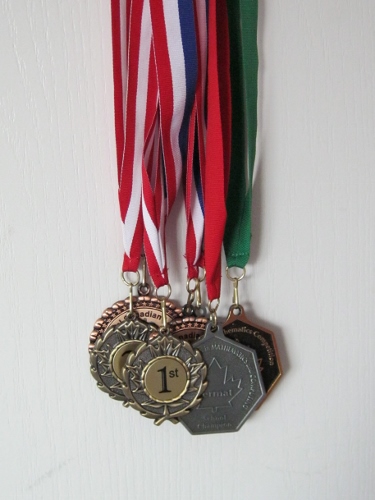One disadvantage of homeschooling is that there is no competition. Our teens often have no idea where they stand in comparison to other teens, so they have no idea what they are really good at. And it turns out that Mom’s opinion about these things does not always carry that much weight.
When Miss 16 was invited to a weeklong math seminar for doing very well on a math competition, she was surprised. When we looked up the seminar on Google and found it was for ‘math whiz kids’ she was astonished.
No matter how many times I had told her she was good at math, no matter how often I would point out that she doing very well, she always thought I was ‘just being positive’.
I think this is partly because we use a challenging math curriculum and because math, therefore, is not an ‘easy subject’ for her. As my husband tells her, “All hard problems seem impossible until you have solved them. Then most of them seem trivial.” Neither of these situations allows a student to make a valid judgement of his or her abilities in the same way that knowing one’s standing in a class of 30 does.
I have had similar scenarios with other children. Just because I insist on polished, proofread essays, does not mean that the teen cannot write; it just means that the teen has not bothered to proofread the essay.
There is also the other side: Some teens think they are doing very well when actually they are not. Again, comparison with a group of peers is missing, and Mom’s opinion just does not seem to carry enough weight.
Competition and comparison can give our teens a more realistic view of how well they are doing. At home, they miss that, and this is one of the few significant disadvantages of homeschooling.
Of course, it is possible to work around this problem in various ways.
In our family we occasionally get our teens involved in competitions. It helps them to stretch themselves, it helps them to gain an objective idea of their aptitudes, and, if they do well, it looks great on their high school records. We also have them take the SAT test, but it, unfortunately, does not really reflect how well they know any particular subject.
Other families use co-ops, online courses, and other sources of outside marks. Whatever methods a family uses is irrelevant, so long as homeschooled teens do have an objective way to evaluate their own strengths and weaknesses as they prepare for their future.
This post is linked to Finishing Strong and Trivium Tuesdays as well as the Carnival of Homeschooling.


Hello Annie, How true your words are. It’s even more so for only children like my son…it’s funny but also true that the same thing mom and dad drill into theur heads sudden have meaning when someone else outside of the home says it!
I believe it also builds self esteem to have a real-world gauge of one’s performance…and for those not doing so well maybe it will give them some fire!
Take Care,
Steve
BLAST! Sorry for the typos. I do know how to spell -:(
Yes, Steve, it would be true for only children as well. Thanks for bringing that up.
I like your point that the things we say as parents suddenly have meaning when someone else says them too. That does give us a significant responsibility to other people’s kids too, doesn’t it?
As for the typos, we all make them. Sigh.
Very well said and I agree they need to know where they stand from someone other then Mom. Blessings!
Kyle
My husband has voiced that concern before. Not that it is a reason to not homeschool, but that it is something to make sure happens in some form or another. Thanks for sharing your experience!
Yes, Kyle and Amy, it is something that needs to happen for homeschooled teens. It makes a big difference to them.
My 16 year old who got the validation about her math is now reading math books for fun! Before, when she did not accept the fact that she was good at it, she did not find much enjoyment in math.